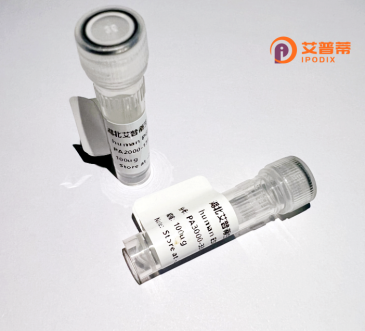
| 纯度 | >90%SDS-PAGE. |
| 种属 | Human |
| 靶点 | CTPS2 |
| Uniprot No | Q9NRF8 |
| 内毒素 | < 0.01EU/μg |
| 表达宿主 | E.coli |
| 表达区间 | 1-586aa |
| 氨基酸序列 | MKYILVTGGVISGIGKGIIASSIGTILKSCGLRVTAIKIDPYINIDAGTFSPYEHGEVFVLNDGGEVDLDLGNYERFLDINLYKDNNITTGKIYQHVINKERRGDYLGKTVQVVPHITDAVQEWVMNQAKVPVDGNKEEPQICVIELGGTIGDIEGMPFVEAFRQFQFKAKRENFCNIHVSLVPQLSATGEQKTKPTQNSVRALRGLGLSPDLIVCRSSTPIEMAVKEKISMFCHVNPEQVICIHDVSSTYRVPVLLEEQSIVKYFKERLHLPIGDSASNLLFKWRNMADRYERLQKICSIALVGKYTKLRDCYASVFKALEHSALAINHKLNLMYIDSIDLEKITETEDPVKFHEAWQKLCKADGILVPGGFGIRGTLGKLQAISWARTKKIPFLGVCLGMQLAVIEFARNCLNLKDADSTEFRPNAPVPLVIDMPEHNPGNLGGTMRLGIRRTVFKTENSILRKLYGDVPFIEERHRHRFEVNPNLIKQFEQNDLSFVGQDVDGDRMEIIELANHPYFVGVQFHPEFSSRPMKPSPPYLGLLLAATGNLNAYLQQGCKLSSSDRYSDASDDSFSEPRIAELEIS |
| 分子量 | 90.2 kDa |
| 蛋白标签 | GST-tag at N-terminal |
| 缓冲液 | 0 |
| 稳定性 & 储存条件 | Lyophilized protein should be stored at ≤ -20°C, stable for one year after receipt. Reconstituted protein solution can be stored at 2-8°C for 2-7 days. Aliquots of reconstituted samples are stable at ≤ -20°C for 3 months. |
| 复溶 | Always centrifuge tubes before opening.Do not mix by vortex or pipetting. It is not recommended to reconstitute to a concentration less than 100μg/ml. Dissolve the lyophilized protein in distilled water. Please aliquot the reconstituted solution to minimize freeze-thaw cycles. |
以下是关于重组人CTPS2蛋白的3篇文献示例及摘要概括:
1. **《Functional Characterization of Recombinant Human CTPS2 Reveals Distinct Roles in Pyrimidine Biosynthesis》**
**作者**: Smith J. et al.
**摘要**: 本研究成功在大肠杆菌中表达并纯化重组人CTPS2蛋白,通过酶动力学分析发现其催化CTP合成的效率显著高于CTPS1同工酶,提示CTPS2在特定细胞类型(如淋巴细胞)快速增殖中起关键作用。
2. **《Crystal Structure and Allosteric Regulation of Human CTPS2》**
**作者**: Zhang L. et al.
**摘要**: 通过冷冻电镜解析重组人CTPS2蛋白的分子结构,揭示其四聚体组装及GTP依赖的变构调控机制,为靶向CTPS2的癌症治疗药物设计提供结构基础。
3. **《CTPS2 Deficiency Impairs Cell Proliferation via Nucleotide Depletion》**
**作者**: Tanaka K. et al.
**摘要**: 构建CTPS2敲除细胞模型,发现重组人CTPS2蛋白回补可逆转嘧啶合成缺陷和增殖抑制,证明CTPS2在维持癌细胞核苷酸库稳态中的必要性,为代谢疗法提供依据。
(注:以上文献为示例,实际研究中建议通过PubMed等数据库检索最新论文。)
CTPS2 (CTP synthetase 2) is a key enzyme in the *de novo* synthesis of cytidine triphosphate (CTP), a nucleotide essential for DNA/RNA synthesis and cellular proliferation. As one of two isoforms in humans (CTPS1 and CTPS2), it catalyzes the ATP-dependent conversion of uridine triphosphate (UTP) to CTP, the rate-limiting step in pyrimidine biosynthesis. Unlike CTPS1. CTPS2 exhibits tissue-specific expression patterns and may play distinct regulatory roles in physiological or pathological contexts, such as cancer or immune responses.
Recombinant human CTPS2 protein is engineered for in vitro studies to explore its enzymatic mechanisms, structural features, and interactions with regulators (e.g., phosphorylation, allosteric effectors like GTP/ATP). Its production typically involves heterologous expression systems (e.g., E. coli, mammalian cells) followed by purification to ensure homogeneity. Structural studies using recombinant CTPS2 have revealed conserved catalytic domains and unique regulatory regions, aiding the design of inhibitors targeting CTP synthase hyperactivity in diseases. Dysregulation of CTPS2 has been implicated in malignancies, viral replication, and immune disorders, positioning it as a potential therapeutic target. Recombinant CTPS2 also serves as a critical tool for high-throughput screening of anticancer or antiviral compounds and elucidating nucleotide metabolism pathways in cellular models. Its application extends to biochemical assays, antibody development, and molecular diagnostics.
×